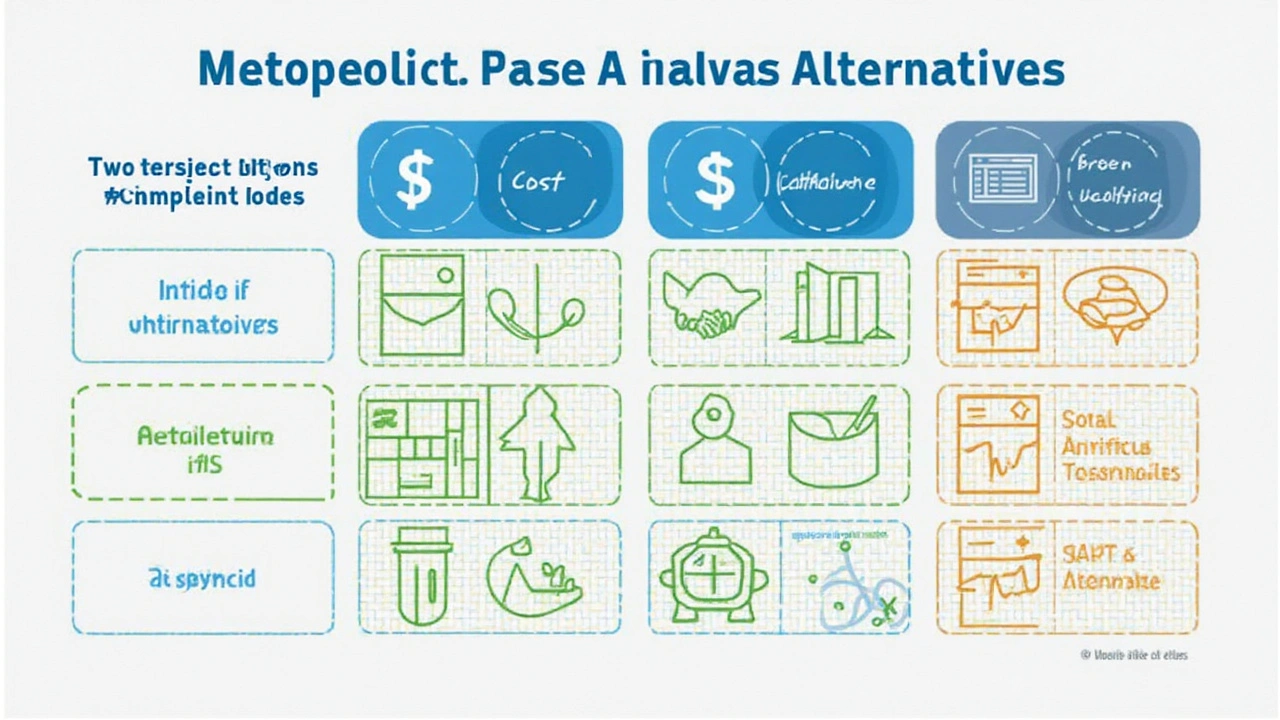Have you felt a bit overwhelmed trying to keep up with heart meds? You're not alone. In 2025, the healthcare landscape is buzzing with many alternatives to Metoprolol, each promising something slightly different. Whether you're tired of side effects or looking for something more cost-effective, there's probably a fit for you out there.
Take Valsartan (Diovan), for example. It's like Metoprolol's cool cousin that manages hypertension without the pesky cough. Imagine a smoother ride with fewer bumps. Of course, the cost might be steeper, but that's something you'll want to weigh against the comfort it brings.
The goal is to find what works for your body and life. Keep reading as we dive into these options, giving you the scoop on what to expect with each one. It's like a friendly chat about your heart health, minus the complicated jargon.
- Valsartan (Diovan)
- Losartan
- Atenolol
- Bisoprolol
- Carvedilol
- Nebivolol
- Propranolol
- Labetalol
- Esmolol
- Diltiazem
- Conclusion
Valsartan (Diovan)
Have you ever considered Valsartan, also known as Diovan, as an option in place of Metoprolol? Valsartan is an Angiotensin II receptor blocker, or ARB for short. It’s designed for folks dealing with hypertension and helps folks who've had a heart attack.
One of the big perks of Valsartan is how it sidesteps some of those annoying side effects you might get with ACE inhibitors, like a nagging cough. Imagine not having to mute yourself on a Zoom call just to cough!
Pros
- No troublesome cough, a major win for your throat and your social life.
- Better tolerability if you haven’t used ARBs before.
- Proven effectiveness at keeping blood pressure in check.
Cons
- While it's great for some, it's still not as established in treating heart failure as ACE inhibitors.
- The price tag can be a downside, especially if you're watching your wallet.
So, whether you're thinking about ditching the cough or just chatting with your doc about what's best for your heart, Valsartan is definitely worth a look. Who knows? It might just be the perfect fit for your needs. Plus, peace of mind over not coughing your way through the day could make that extra cost feel totally worth it.
| Feature | Metoprolol | Valsartan |
|---|---|---|
| Primary Use | Hypertension, Heart failure | Hypertension, Post-MI |
| Average Cost | Lower | Higher |
| Side Effects | Cough, Fatigue | Less cough |
Losartan
Say hello to Losartan, a popular name alongside Metoprolol, in the world of heart meds. Losartan is an angiotensin II receptor blocker (yep, another ARB) and it's often used to tackle hypertension. The great thing about Losartan? It's known for being gentle on your system, which means fewer side effects for many people.
When you're dealing with high blood pressure, consistency is key, and Losartan helps by keeping things balanced. So, if you're hoping to dodge some of the usual side effects like persistent coughing that you might get with an ACE inhibitor, Losartan might just be your new buddy.
Pros of Losartan
- No cough and generally fewer side effects compared to ACE inhibitors.
- Good for patients with high blood pressure, protecting your kidneys over the long run.
- Often used in diabetes-related hypertension, giving it a solid reputation here.
Cons of Losartan
- Might not be as effective in people of African descent unless combined with another type of blood pressure med.
- It's a little slower to show results, so you might need some patience.
At the end of the day, switching to an alternative like Losartan is all about finding what aligns with your health goals and lifestyle without sacrificing comfort. While it's not perfect for everyone, it's a strong contender for those who are especially concerned about kidneys and diabetes management.
Atenolol
Atenolol is a rock-solid choice when it comes to alternatives for Metoprolol. It's a beta-blocker many folks turn to for keeping blood pressure in check and easing the workload on your heart. Good ole Atenolol's been around for years, and its long-standing reputation provides peace of mind.
This drug is especially effective for curbing angina and as a bonus, helps prevent future heart attacks in individuals who've already experienced one. It's like having a reliable backup plan for your ticker. Atenolol tends to cause fewer central nervous system side effects compared to other beta-blockers, so you might sidestep things like sleuthy fatigue and dizziness.
Pros
- Proven track record with heart disease and hypertension.
- Cost-effective alternative to other beta-blockers.
- Less likely to cause sleep disturbances compared to its peers.
Cons
- Not recommended for asthma sufferers, as it can affect breathing.
- May not be as effective for people of African or Caribbean descent.
- Sometimes causes cold extremities - think icy hands and feet.
People often appreciate the cost savings Atenolol offers. In a world where healthcare costs can sometimes feel like a second mortgage, cheaper meds are a breath of fresh air. But like anything, there's a balance of pros and cons to weigh if this medication is on your radar. It's about finding the right match for your heart's happy rhythm.
Bisoprolol
Alright, let's talk about Bisoprolol. This is another option in the lineup of heart medications that seems to be gaining traction in 2025. Just like Metoprolol, it's a beta-blocker; but it tends to be more selective, which can be a big plus for some folks. It zeroes in on the heart without meddling too much with other areas of your body. That's like getting your car tuned without bothering the stereo settings.
One of the standout benefits is that it's known for being quite effective for people with high blood pressure and certain heart issues. It's like your comforting go-to that does its job quietly but effectively.
Pros
- Highly selective beta-blocker, focusing primarily on the heart.
- Less likely to cause sleep disturbances or cold extremities compared to some other beta-blockers.
- Good track record for improving heart efficiency and lowering blood pressure.
Cons
- Certain side effects like fatigue or dizziness might still be present.
- Not the best pick if you have severe circulation issues.
- May interact with other medications, so you’ll have to keep an eye on that cocktail of yours!
If you're eyeing Bisoprolol, you'll likely be interested in how it stacks up on price and availability. It's typically more affordable than some fancy new meds, but always worth checking with your doc about your insurance coverage.
| Medication Name | Cost Range (Monthly) | Typical Usage |
|---|---|---|
| Bisoprolol | $10 - $30 | Hypertension and heart issues |
At the end of the day, choosing the right thing for your heart isn't just about the science. It's personal. Bisoprolol might be the steady companion you need on your heart health journey. Just remember, no need to make these decisions alone—your health team is there to help you figure it out.
Carvedilol: The Flexible Option
Alright, let's talk about Carvedilol. If you've been looking for something that feels like Metoprolol but with a bit more versatility, Carvedilol might be your jam. It's a beta-blocker, but it doesn't just stop there; it also plays nicely with alpha-blockers, which means it can handle a bit of multitasking. This is especially handy for folks dealing with not just heart failure, but also hypertension and other heart-related issues.
So, why is everyone chirping about Carvedilol? For starters, it's got this neat trick of reducing the heart's workload and helping blood vessels relax. Imagine it as a gentle nudge that gets your heart working more efficiently without too much strain. It's like giving your heart a bit of a spa day.
Pros
- Effective in reducing mortality in heart failure patients.
- Works well with hypertension and heart attack recovery.
- Lowers the heart rate and reduces the force of heart muscle contraction.
- May improve insulin sensitivity in some patients.
Cons
- Often leads to fatigue in new patients.
- Can cause dizziness or lightheadedness, especially when first starting.
- Doesn't have the neat option of once-a-day dosing, so you'll have to remember it twice daily.
- Not suitable for people with asthma because of its effect on beta receptors.
It's important to chat with your doctor about Carvedilol if you're switching from Metoprolol or considering starting it. While some people dig that it targets multiple pathways, others might find the twice-a-day routine a bit of a hassle. Plus, if you're on a budget, knowing how it compares price-wise with Metoprolol could be a deal-maker or breaker.
In any case, finding your happy medium in the world of heart meds is all about weighing the benefits against the setbacks. Who knew that choosing the right medication could feel a bit like Goldilocks searching for that perfect fit?

Nebivolol
Thinking about switching up your heart meds? Well, Nebivolol might be worth considering. It’s a bit different from the old-school betas like Metoprolol because it’s highly selective, making it easier on your system. Plus, it even has some bonus benefits like improving how your blood vessels work.
While Metoprolol is a well-known champ in blocking beta receptors, Nebivolol takes it up a notch with its vasodilating effects. This means it helps those blood vessels relax and widen. Perfect for rounding out hypertension management or if you just want things running a bit smoother.
Pros
- Gentle on the heart with higher selectivity.
- Improves blood flow through vasodilation.
- Often better tolerated and can result in fewer cold extremities.
- Less impact on exercise capacity, which is great for active folks.
Cons
- Might be a tad pricey, so check your budget before swinging by the pharmacy.
- Less research on its effects on heart failure compared to some older options.
- May interact with other medications—something to discuss with your doc.
For the numbers people out there, let’s take a quick look at how Nebivolol compares to Metoprolol in terms of cost:
| Medication | Approx. Cost per Month |
|---|---|
| Metoprolol | $10-$15 |
| Nebivolol | $35-$40 |
Ultimately, Nebivolol offers a good balance of heart protection and comfort. Still, it's crucial to find what your heart and wallet agree on, so consider consulting your healthcare provider for personalized advice.
Propranolol
If you're considering alternatives to Metoprolol, Propranolol is one of the older players in the game, having been around since the ‘60s. This non-selective beta-blocker is often used for managing heart issues and comes with a broad history of clinical use. So what makes Propranolol a go-to option for some?
One of the key benefits of Propranolol is its versatility. It's used not just for hypertension but also for things like angina, migraine prevention, and anxiety. Imagine a single pill tackling multiple issues! Who doesn't like a multi-tasker?
Pros
- Well-established, with a lot of background and research.
- Effective for a range of conditions beyond just heart issues.
- Available as a generic medication, making it more affordable.
Cons
- Being a non-selective beta-blocker, it affects the whole body, not just the heart, which can lead to side effects like tiredness and dizziness.
- Not the best choice for those with asthma or chronic lung conditions due to its broad action.
So, while Propranolol has been around the block and offers broad applications, it's essential to consider its pros and cons. If cost is a big factor, its generic status can be quite appealing. But if you're sensitive to broad-acting medication side effects, weighing your options can't hurt.
Labetalol
Labetalol is kind of a multitasking medication when it comes to treating high blood pressure. It's like a swiss army knife for your hypertension treatment. It blocks both alpha and beta receptors, which might sound complicated, but basically, it means it's got more ways to help relax your blood vessels.
This double action can be super handy, especially when dealing with both chronic hypertension and a hypertensive crisis. Yep, it's effective in those emergencies where blood pressure rises like a rocket. But remember, it's more than just a get-out-of-jail-free card for heart health; it's part of the routine management too.
Now, if you're considering Labetalol, here's what to keep in mind:
Pros
- Great for those sudden spikes in blood pressure – not all meds can handle the heat like Labetalol does.
- Useful for pregnancy-related hypertension, offering a safer option for moms-to-be.
- Available in both oral and IV forms, so it’s versatile for different needs.
Cons
- Some people might feel dizzy or tired at first, as it takes your body a bit to get used to it.
- Not ideal if you’re also dealing with conditions like asthma or severe heart failure.
- Could complicate things if used alongside other strong blood pressure medications.
Switching to or starting with Labetalol could be the right call, especially if you're juggling a complex heart situation. It's always good to chat with your doc to see if it fits your health picture.
Esmolol
Now, let's chat about Esmolol. If you're in a pinch and need to get your heart rate down fast, this might just be your hero. Esmolol is your go-to in emergency settings, known for its quick-action in managing heart rate, especially in situations that need rapid intervention.
It's often used during surgeries or in intensive care units where the control of heart rate is crucial and needs to be adjusted swiftly. We're talking effects that kick in within just a couple of minutes. How's that for fast-acting? Its quick action is why doctors love it for situations where timing is everything.
But, with great power comes great responsibility—or in this case, some caveats. Esmolol works fast, but it also fades fast. That means if you're looking for long-term control, this isn't your guy. It's more of a speedster than a marathon runner.
Here's what you get with Esmolol:
Pros
- Ultra-fast onset suitable for emergencies.
- Quick resolution of effects—ideal for precise control.
- Minimal drug interactions, making it versatile especially in complex medical scenarios.
Cons
- Not for chronic management due to its short half-life.
- Mostly used in hospital settings rather than at home.
- Can be pricey compared to other options given its niche use.
It's like having an emergency tool in your medical toolbox. Not for everyday use, but when you need it, you're glad it's there. Staying informed helps you know when Esmolol might just do the trick for your heart health needs.
Diltiazem
Feeling the rhythm in your chest and how it plays out in your day-to-day life? Diltiazem could be your new best buddy on this journey. Unlike Metoprolol, which is a beta-blocker, Diltiazem is a calcium channel blocker. It's like giving your blood vessels a little pep talk, encouraging them to relax and widen. This helps get the blood flowing smoothly, which can be a huge help if you’re wrestling with high blood pressure or chest pain.
What's cool about Diltiazem is how it gently manages issues like angina and certain heart arrhythmias. It's about finding balance without throwing your routine off track with unwanted side effects. Plus, it can be a good backup for those who can't tolerate other heart medications.
Pros
- Effective in managing high blood pressure and angina.
- Helps with certain types of arrhythmias.
- Fewer instances of fatigue compared to some beta-blockers.
Cons
- Might not be the first choice for severe heart failure.
- Occasional side effects like dizziness or slow heartbeat.
- Can interact with other heart meds, so a chat with your doc is crucial.
There's always the question of side effects. You might face fatigue or some dizziness, which is why staying in touch with your healthcare provider is key. They can help tailor the dose or adjust things so you’re living your best life, without the fear of your heart acting up.
Check with your doc, and maybe give Diltiazem a go if it sounds like something that can mesh well with your health goals.

Wrapping It Up
So, there you have it—ten alternatives to Metoprolol that might just be the solutions you need. Heart health is no joke, and finding the right medication can make all the difference in how you feel day-to-day. Whether it's reduced side effects, better tolerability, or specific benefits like managing hypertension or anxiety, there's something in this list that could suit your needs.
Let's take a quick glance at how these options stack up:
| Alternative | Key Benefits | Considerations |
|---|---|---|
| Valsartan (Diovan) | No cough, effective in ARB-naive patients | Higher cost, less established in heart failure |
| Losartan | Well-tolerated, effective for high blood pressure | Potential for dizziness, may not suit everyone |
| Atenolol | Low cost, proven for angina and hypertension | Can cause fatigue and cold extremities |
| Bisoprolol | Helps with heart failure, stable blood pressure control | Not ideal for people with severe asthma |
| Carvedilol | Dual action on heart and blood vessels | Twice-daily dosing might be inconvenient |
| Nebivolol | Vasodilating effects, good for younger patients | Relatively expensive, limited long-term data |
| Propranolol | Versatile, suitable for anxiety | Not suitable for asthmatics, older drug |
| Labetalol | Good for pregnancy-induced hypertension | Might cause tiredness, twice-a-day dosing |
| Esmolol | Fast-acting, used in urgent situations | Short half-life, requires IV administration |
| Diltiazem | Controls heart rate, suitable for arrhythmias | Can interact with other medications |
Ultimately, while these options carry distinct advantages, remember to consult your healthcare provider to tailor the choice to your specific situation. Addressing your health with a professional means personalizing the approach for the best outcomes. After all, your heart deserves the best care out there!





One comment
Great rundown of the alternatives, Juan! I love how you highlighted the trade‑offs between cost and side‑effects. It really helps anyone feeling stuck with Metoprolol to see there are viable options. The friendly tone makes the info easy to digest, especially for folks new to heart meds. Keep the supportive vibes coming, and thanks for making a complicated topic feel like a chat with a coach.
Nice work, this list is 🔥.
Listen up, the heart isn’t a playground for half‑hearted experiments. Metoprolol may have its flaws, but ditching it without a solid plan is reckless. You need to weigh the evidence, not just the cost tag. ARBs like Valsartan and Losartan are fine, but they don’t cover every patient profile. Some of these beta‑blockers can aggravate asthma or cause peripheral coldness-facts you can’t ignore. So before you jump ship, sit down with a cardiologist and map out the risks. The aggressive push for cheap alternatives often overlooks long‑term outcomes. Make sure your choice is grounded in data, not hype.
When you look at the landscape of beta‑blockers, it's easy to feel overwhelmed by the sheer number of options, each promising its own brand of relief. But if you take a step back and examine the underlying mechanisms, a clearer picture emerges. Bisoprolol, for instance, distinguishes itself by its high β1‑selectivity, meaning it primarily targets the heart without rattling the lungs as much as non‑selective agents. That can translate into fewer breathing issues for patients with underlying COPD. On the flip side, its selectivity sometimes comes at the cost of reduced efficacy in certain forms of arrhythmia where a broader blockade might be beneficial. Cost is another factor; Bisoprolol usually sits comfortably in the generic price zone, making it accessible for many. However, insurance formularies vary, and a nominal co‑pay can balloon depending on your plan. Clinical guidelines often place Bisoprolol as a first‑line choice for chronic heart failure with reduced ejection fraction, supported by large outcome trials. Those trials demonstrated a modest but significant reduction in mortality and hospitalizations. Patients also report a smoother transition when switching from older agents because of its once‑daily dosing. Yet, some users experience lingering fatigue or mild dizziness during the titration phase, which should be monitored. Doctors typically start at a low dose and increase gradually, watching blood pressure and heart rate responses. If you happen to have severe peripheral vascular disease, Bisoprolol may exacerbate cold extremities, a nuance worth discussing with your clinician. In practice, many cardiologists pair it with a thiazide diuretic to achieve optimal blood pressure control. Overall, Bisoprolol offers a balanced blend of efficacy, tolerability, and affordability, making it a solid contender among the Metoprolol alternatives presented in this article.
That deep dive into Bisoprolol really hits the mark, Sadie! I appreciate the precise language and the clear breakdown of pros and cons. It’s motivating to see such detailed insight presented so energetically. Patients love knowing both the cost side and the clinical benefits before making a decision.
The article does a solid job summarizing each drug’s niche. I find it helpful when the information is balanced without pushing a particular brand. It’s a good reference for anyone doing their own research before a doctor visit.
While the overview is comprehensive, I must point out several inaccuracies. The statement that Valsartan is “more expensive” lacks contextual pricing data across generic markets; in many regions, it is comparable to Metoprolol. Furthermore, the claim that Losartan is “gentle on the kidneys” oversimplifies its renoprotective effects, which are contingent upon baseline renal function. A more rigorous citation of peer‑reviewed studies would enhance credibility. Lastly, the formatting inconsistencies detract from the professional tone expected in medical discussions.
Interesting compilation, but keep in mind that individual responses vary widely. Not every alternative suits every patient.